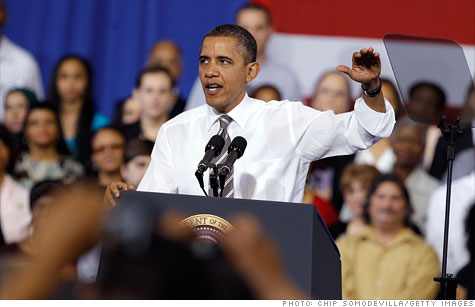Search News

President Obama's budget would result in higher tax bills for one third of households, but the rich would see the biggest jump.
NEW YORK (CNNMoney) -- Wealthy taxpayers would see a big jump in their tax bills under President Obama's latest budget proposal, according to a new independent analysis.
In fact, those in the top 1% of income would see an average tax increase of nearly $109,000 in 2015, according to the Tax Policy Center.
The increase is relative to what people would pay if lawmakers chose to extend a number of policies, such as the Bush-era tax cuts, that are otherwise set to expire. (Video: No presidential fix for housing crisis)
In the Tax Policy Center's analysis, the top 1% are those with cash income of at least $630,000. That number counts paychecks, investment income and other less obvious sources of money such as the subsidy employers pay for their workers' health insurance.
Overall, an estimated 16% of households would end up with lower tax bills under Obama's proposal, which was laid out last month in the president's 2013 budget.
And about 33% of households would face a higher tax bill, but for many of them, the increases would likely be small, Roberton Williams, a senior fellow at the Tax Policy Center, wrote Wednesday in a blog post.
For instance, nearly 63% of tax filers with incomes between $100,000 and $200,000 would see a larger tax burden, but the average increase would be less than $500, according to the center.
But those making $200,000 to $500,000 -- of whom 73% would get a tax hike -- would pay $4,942 more on average.
The increased tax bills for the rich are driven by three Obama proposals. He is calling for the top two income tax rates -- currently 33% and 35% -- to rise to 36% and 39.6%. He would raise the tax rate on capital gains and dividends for high-income households to 20% from 15% today. And he would limit the value of their itemized deductions.
The increased burden on high-income taxpayers under Obama's budget stands in contrast to the tax plans of his potential Republican rivals in the presidential election. Their proposals would end up cutting taxes for most households, but the biggest breaks would go to the top 1%.
The same is true in terms of overall federal revenue.
Over the next decade the president's budget would raise about $2.1 trillion more than would be the case if Congress just extended today's tax policies, the center estimates.
Under Mitt Romney's tax plan, the federal government would lose $3.4 trillion. That's in large part because Romney has not yet specified how he would pay for his proposed 20% reduction in tax rates across the board. ![]()

Carlos Rodriguez is trying to rid himself of $15,000 in credit card debt, while paying his mortgage and saving for his son's college education.
| Overnight Avg Rate | Latest | Change | Last Week |
|---|---|---|---|
| 30 yr fixed | 3.80% | 3.88% | |
| 15 yr fixed | 3.20% | 3.23% | |
| 5/1 ARM | 3.84% | 3.88% | |
| 30 yr refi | 3.82% | 3.93% | |
| 15 yr refi | 3.20% | 3.23% |
Today's featured rates: